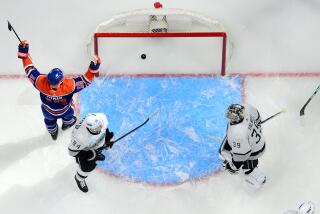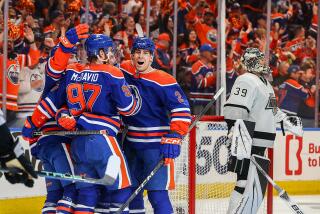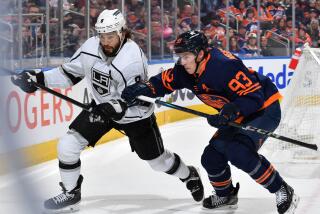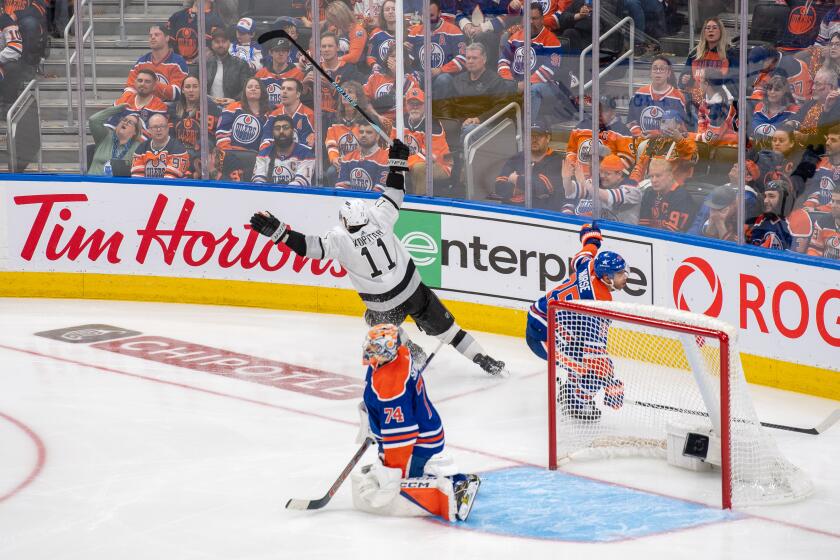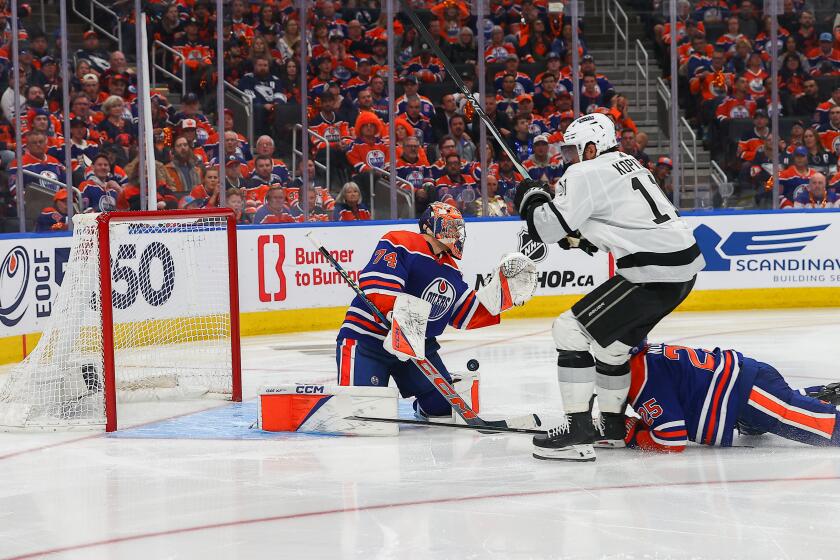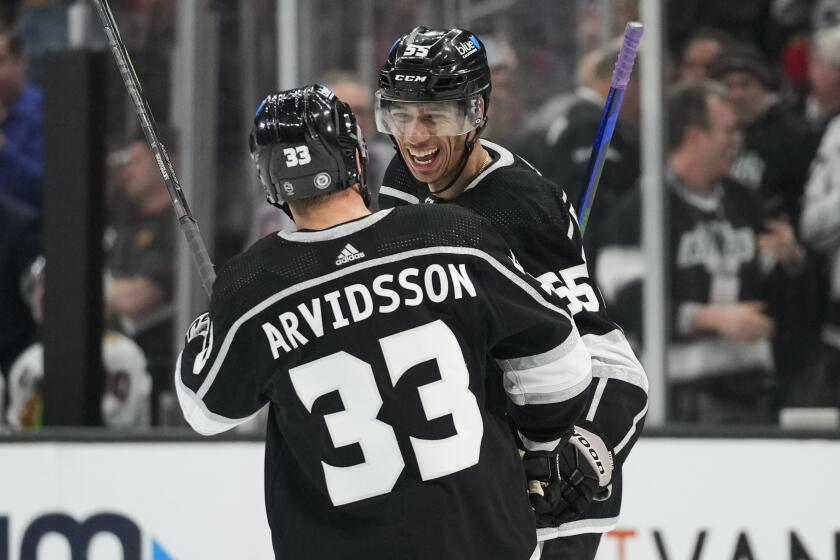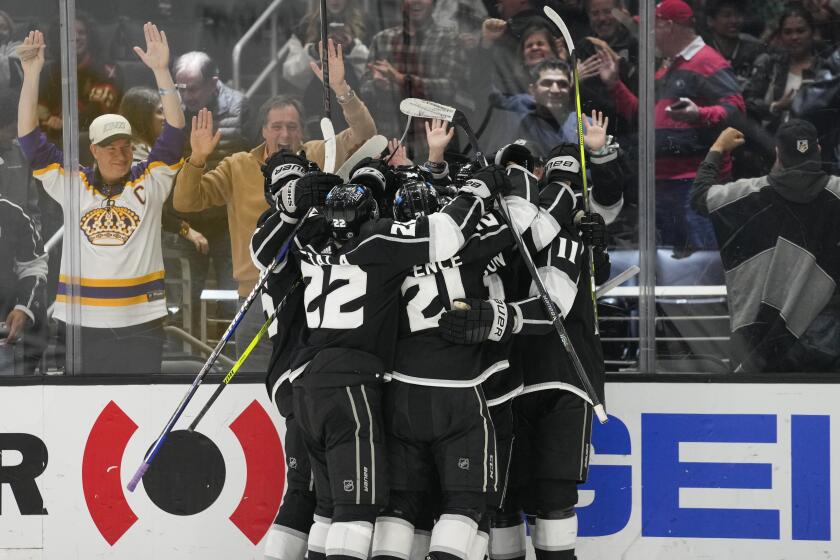The Kings-Rangers fight we can’t forget: Remember the ’81 brawl?
“If the referee goes by the rule book now, there will be nobody left to play the hockey game.” — Bill Chadwick, New York Rangers television analyst
The ice at the Forum was so crowded that night in 1981, it looked like the rink at New York’s Rockefeller Center in December. This, though, was far from a pleasure skate.
The Kings and New York Rangers had beef. It was the last time the two teams met in the Stanley Cup playoffs, and Game 2 of the first-round series was a red-meat moment. The first period was extended, unofficially, for eight minutes as players from both teams scrapped.
“I don’t remember too much from the 1980s, but I remember that big brawl,” said Mark Hardy, a Kings defenseman that season.
It was a different NHL, far removed from what will occur in the playoff reunion when the Kings and Rangers face off Wednesday in Game 1 of the Stanley Cup Final at Staples Center.
Back in 1981, the Kings seemed to be on the rise, having finished that season with the league’s fourth-best record. Their Triple Crown line — Dave Taylor, Marcel Dionne and Charlie Simmer — was the most potent scoring trio the NHL had ever seen.
“Watching them was like watching Picasso paint,” said Bob Berry, the Kings’ coach from 1978-81.
It was also an era when the joke “I went to a boxing match and a hockey game broke out” was fitting. The Kings and Rangers provided that punch line during a best-of-five “preliminary round” series, won by the Rangers in four games.
“There was a lot of havoc in that series,” Hardy said. “It was nasty.”
The Kings, and their fans, could only think what-might-have-been. Simmer missed the series, after breaking his leg late in the season. The Rangers had barely made the playoffs but showed up in Los Angeles ready to send a message.
“They were obviously looking to stir things up,” Taylor said.
When it was over, the Kings were left with a false spring, and they missed the playoffs three of the next five seasons.
::
“Dave Taylor skated up into the Rangers’ zone. This is what started this whole mess. The Kings go off at the other end of the ice, but Taylor kept skating.” — Chadwick.
Skating into an opponent’s zone, causing a little chaos, was Taylor’s job. It was part of what made the Triple Crown line such a problem for opponents and, at times, Kings teammates.
“Those guys all had white tape on their sticks,” Hardy said. “I’d take a shot and think I’d scored. One of them would come to the bench and show a black mark on the tape and go, ‘No, no, I touched it.’”
Taylor had sympathy for others on the team trying to score.
“They not only had to get the puck past the goaltender, they had to get it past the three of us,” he said.
Dionne was already a star when the Kings acquired him in 1975. He arrived a week after Kareem Abdul-Jabbar came to the Lakers. Both teams were owned by Jack Kent Cooke, who craved marquee names for a Hollywood market.
The other two were finds.
Taylor was a 15th-round pick in 1975. He and Dionne were tethered during the 1977-78 season. Simmer was a free agent signed more as cannon fodder. Yet, he turned out to be the missing piece.
“It’s difficult finding that third guy,” Dionne said. “There was Wayne Gretzky and Jari Kurri [with Edmonton], Teemu Selanne and Paul Kariya [with the Ducks]. A third guy has to surface.”
Simmer was recalled from the minors during the 1978-79 season. Things clicked.
“He was probably the best I have seen in front of the net,” Taylor said.
The three were linked in January, and Berry “showed patience with us,” Taylor said. He didn’t have to wait long.
In 1979-80, their first full season as a line, Simmer led the NHL with 56 goals and Dionne was tops in scoring with 137 points. The three combined for 146 goals and 328 points.
Berry said “the best thing I ever did as a coach was put that line together.” Of course, he also said, “The worst thing I ever did was sending Charlie to the minors in the first place.”
The three meshed.
“I told them to never look to me, just get to the holes,” Dionne said. “Dave would dig the puck out of the corners. Charlie was unbelievable in front of the net.”
And . . .
“Marcel had eyes in the back of his head,” Hardy said.
They were as competitive as they were talented.
“We were losing to a junior team through two periods during a preseason game in Portland,” Berry said. “Those three didn’t want the stigma of losing to a junior team. They went out and scored three or four goals.”
Scoring goals just came naturally.
“Rob Palmer took a shot that hit Marcel in the nose and went into the net,” Hardy said. “Marcel came to the bench bloody and mad. Then he found out he was credited with the goal and wasn’t so unhappy.”
The 1980-81 season was their masterpiece. They finished with 161 goals and 352 points, becoming the first line to have all three players score 100 points.
The Kings recorded 43 victories, then the most in franchise history.
Simmer suffered that broken leg during a game in Toronto a month before the playoffs. The Kings went on to finish as the fourth seed, but heading into the postseason, “Charlie’s injury left too big of a hole,” Hardy said.
::
“I have been in this thing for a long, long time, and I have never seen anything worse than this.” — Chadwick
The Rangers have been anointed with a few nicknames. Broadway Blueshirts was one. Broadway Bullies was another. It was clear which of those arrived in Los Angeles that spring.
The Rangers had slipped into the playoffs but pulled off a 3-1 upset in Game 1 at the Forum. Their strategy was clear.
“Eddie Hospodar hit me in the corner on the first shift,” Dionne said. “It was obvious they wanted to intimidate us.”
That led to Game 2. The spark, players said afterward, was a cheap shot by the Rangers’ Barry Beck. He and the Kings’ Rick Chartraw jawed at each other and, while Chartraw was being backed away by the referee, Beck arched over and sucker-punched him, opening a gash under Chartraw’s eye.
The fuse was lighted.
The Kings scored two goals during the power plays that followed. That didn’t provided closure. When the period ended, the benches emptied.
“There was the ‘third man in’ rule,” Hardy said about a player being ejected for joining a fight. “If they had enforced that, we would have been in trouble. We had five or six third men in that night.”
Los Angeles Times writer Gordon Edes compared it to the final night of the 1981 TV miniseries “Masada.” The difference, he wrote, was the “slings and arrows of the Romans and Jews were replaced by high sticks, low blows and an all-out brawl.”
Seven NHL playoff records were set, none to brag about. All were for penalties, including the number (59) and the minutes (267).
The first punches were thrown by Hospodar and Dionne. Hospodar carried the nickname “Boxcar” because his checks were like a runaway train car. Dionne had long advocated violence-free hockey.
Even Paul Pageau, the Kings’ 5-foot-8 backup goaltender, and the Rangers’ Nick Fotiu, a 6-2, 210-pound forward, got involved. Neither was in uniform, but when Pageau tried to tie up Hospodar, Fotiu jumped him. A bodyguard for Kings owner Jerry Buss interceded. After the game, Pageau said, “Boy, was I happy.”
The Kings won that battle, 5-4, to even the series. But they lost the war. The Rangers won two mostly shenanigan-free games in Madison Square Garden.
“We just ran out of steam,” Dionne said.
::
“This kind of a thing can set the game back 10 years.” — Chadwick
The Rangers reached the Stanley Cup semifinals in 1981, when the NHL seeded playoff teams 1-16, regardless of conference affiliation.
The Kings were set back.
About their only notable accomplishment over the next six seasons was the “Miracle on Manchester” game that fueled the Kings’ first-round upset of the Edmonton Oilers in the 1982 playoffs.
Simmer returned in 1981-82, scoring 15 goals in 50 games. Taylor continued to dig out pucks and score goals. Dionne was still a whiz. But the Triple Crown line had been supplanted in the NHL. The Gretzky Era was dawning in Edmonton.
“In those days, the Kings didn’t build for the future,” Dionne said. “They built for the now. We had a chance to build after the 1981 season. Then Bob Berry left.”
Berry was rumored to be on his way out before the 1981 playoffs began. His relationship with Buss and general manager George Maguire soured.
“We lost a game late in the season when they let the clock go,” Berry said. “On the way off the ice, I went over to the timer and was screaming at him and was banging on the board in front of him. It cracked and the bill was $3,000. Dr. Buss and Maguire wanted me to pay for it.”
Berry left to become the Montreal Canadiens’ coach.
The constant change had an effect.
“You would come to training camp and there would be 10 guys missing from the previous season,” Hardy said.
Simmer was gone midway through the 1984-85 season following a contract squabble. Dionne was traded during the 1986-87 season. Taylor stuck with the Kings his entire career, and was their general manager from 1997-2006.
All that remains from the 1980-81 season are two memories.
“That was a great line,” Hardy said.
And . . .
“That was a pretty good brawl,” Taylor said.
More to Read
Go beyond the scoreboard
Get the latest on L.A.'s teams in the daily Sports Report newsletter.
You may occasionally receive promotional content from the Los Angeles Times.
